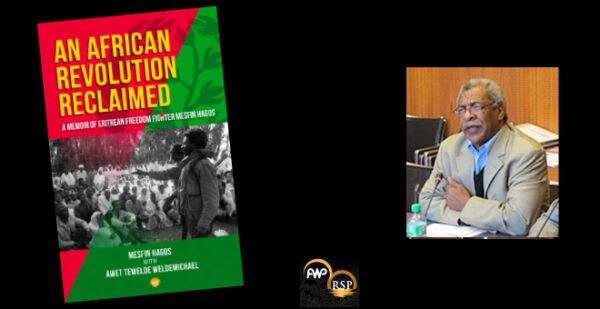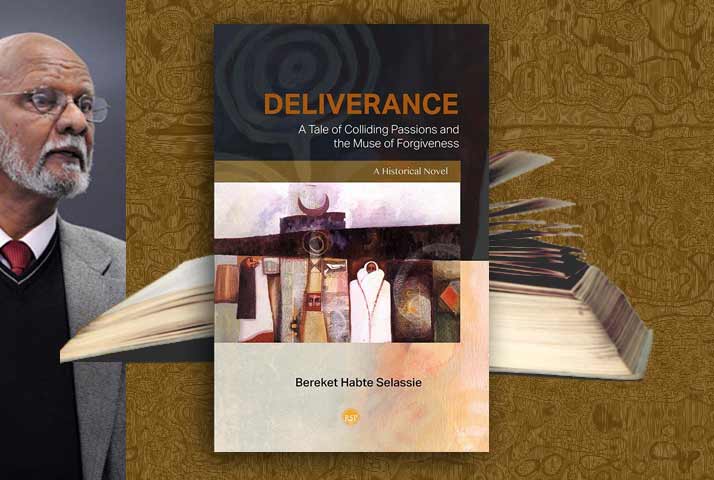Interview with Dr. Bereket Habteselassie (Part 2)

“In my view, accepting even an imperfect constitution (imperfect both in terms of the process of its making and its content) and using it as a unifying or rallying point would be a wiser way, leaving to another day the task of improving or substituting it by another constitution.” Dr. Bereket.
This concludes the part of the interview which focused on the constitutional making process (click here to read the first part: ) and the next part(s) will deal with the substance of the constitution and the questions that have been raised by readers. Dr. Bereket is an octogenarian who has impressively kept a full-time work schedule; written four books in the last ten years and scores of articles; travelled extensively to give lectures in many universities and international forums; and is currently working on a book while teaching a summer class. I’m honored that he made the time to talk to me and very appreciative of his willingness to keep the public engaged.
Semere: In the first step of the constitutional making process, the establishment of the Constitutional Commission, you’ve said that you relied on your own professional expertise, the EPLF charter and your own sense and knowledge of the EPLF that you’ve been a member of since 1975. Were you entirely responsible for this task or you had the assistance of others and if that is the case, do you care to tell us who those people were? Were you also responsible for drawing the “general plan of approach” and for “presenting the plan to the first meeting of the Executive Committee and then the general body (the Council) of the Commission” in the second stage?
Dr. Bereket: I was given a free hand to draft the law establishing the Commission as well as planning the organization and shaping the strategy of the process of constitution making. I was also given the choice of some of the members of the core organ of the Commission, namely the members of the Executive Committee. In particular, I asked for the following members to be among those to be included in the Executive Committee: Seyoum Haregot, Amare Tekle, and Paulos Tesfagiorgis. I had asked a couple of others who happen to be lawyers also to be included, but the Powers-that-be did not include them. They were Gebrehiwot Tesfagiorgis and Eden Fassil. Eden was understandably excluded because he is one of the principal legal advisers of the president. And Gebrehiwot was included in the Council of the Commission, but not in the Executive Committee.
So, to answer the question whether I was entirely responsible for the task the answer is yes for working out the strategy and laying down the parameters of the Commission’s work as detailed in the law establishing the Commission (Proclamation Number 55 of 1994). As to the conduct of the process after the Commission started its work, I had the invaluable assistance of several members of the Commission, including Paulos, Seyoum, Musa Naib, Zemehret, Gebrehiwot, Tekie Fessehatsion, Mehret Iyob, Taha Mohammed Nur, and Kibreab Habtemichael from the Council, and Amna Naib from the Ex-Com, to mention but a few. As I said previously, the entire membership of the Commission was involved in participating in seminars and other forms of meetings in propagating the philosophy behind the process, as we saw it and in answering questions coming from the public.
Semere: I understand the need for legal expertise, but, I’m sure you would agree with me that constitutional making is an inherently political process, and if so, why didn’t you try to reach out to other Eritreans who could have added more credibility and legitimacy to the process. Don’t you think it would have been better to include the late Seyoum Harestay instead of the late Seyoum Haregot or Amare Tekle? The former had a life-time record of fighting for Eritrea, while the latter had none and to the contrary, he waged a diplomatic attack on the Eritrean revolution while serving the Haileselassie regime. Let’s not forget that when the late former foreign Minister of Eritrea, Ali Said Abdella and his brave comrades were in jail in Karachi, Pakistan for highjacking an Ethiopian plane, it was Seyoum Haregot who was busy at work trying to obtain their extradition to Ethiopia where they could have been subjected to torture and possibly death. Why on earth do you want to honor somebody like Seyoum Haregot to be part of the process that is designed to have the utmost impact in our lives and the lives of future generation of Eritreans?
Dr. Bereket: As to Seyoum’s membership of the Commission, it is based on his legal qualifications as well as experience. I did not know about his involvement as a negotiator in the Ali Said case, or of his role in attempts to persuade Tito to help Ethiopia against Eritrea, a claim that I learned much later. On the whole, I believe in forgiveness, and it appears that Isaias was also, for his own reasons, inclined to forgive the kind of deeds of which you seem to think that should disqualify Seyoum from helping in the constitution making of Eritrea.
With regard to Seyoum Harestay, you know that I had recommended in my booklet that the ELF should be involved in post-independence Eritrean politics, a suggestion that was not only rejected by Isaias, but earned me his enmity. Any suggestion by anybody to include Seyoum Harestay, or any ELF leader would be rejected outright by Isaias.
When Isaias asked Seyoum Haregot to chair the Commission before he asked me. Seyoum did not feel able or willing to assume the responsibility of chairmanship of the Commission. Why Isaias then turned to me is open to speculation. Those close to him speculated that he was anxious to avoid seeming hostile to me. The rest is history, as they say.
Semere: Yes, you’re right I’ve read the booklet in which you advocated ELF’s participation in independent Eritrea, but, when push comes to shove, you should have stood your ground and drew the line somewhere. I’m not saying you should have made the perfect the enemy of the good, but this was so monumentally important that you should have made your views, at least, known to the public. How were you able to reconcile your political ideals with the necessity of being pragmatic? Any regrets about this?
Dr. Bereket: I don’t know what you are referring to when you say “this was so monumentally important.”
Semere: I meant the inclusion of ELF and others since constitution making is an inherently political process. I understand to err is human and to forgive is divine but I tend to believe that genuine forgiveness is a two-way street. When two generation of Eritreans fought for Eritrean identity, the late Seyoum was unapologetically Ethiopian and neither did he acknowledge his mistakes nor apologize for it. Why such generosity of spirit was extended to the likes of Seyoum Haregot and not to bonafide heroes like Seyoum Harestay who devoted their life to the cause of Eritrea since their teenage/student days? The involvement of the latter could have greatly added to the legitimacy of the constitution and played a crucial role in our nation building efforts and aspirations. You can understand why some are hesitant to embrace the 1997 Constitution? Why should they support the outcome of a process from which they were systematically excluded?
Dr. Bereket: I think you are making the mistake of assuming that I could influence Isaias in the choice of appointing members of the Commission. I did not. I tried to have as many trained lawyers to fill the Executive Committee, which was to be the drafting committee of the Commission; but even there he rejected some names like Eden Fassil for his own reason. As you know and as I already pointed out, he was averse to having the ELF having any role in post-liberation political life. The alternative left for me was to invite ELF members in the Diaspora to take part in the process, and we did that with some moderate success. Frankly, I don’t follow your logic of comparing Seyoum Harestay with Seyoum Haregot asking me to extend the same “forgiveness” to the former. I knew of nothing for which Seyoum Harestay needed forgiveness! In any case, asking Isaias to include Harestay in the Commission would have been an exercise in futility; and I did not see the necessity of wasting my time and breath to that futile exercise.
Semere: Reconciliation and reaching out to people that are not with you is always a good thing. I don’t have a problem with the Eritrean government reaching out to Eritreans who served in the Dergue and the Ethiopian regime, but, the priority should have been given to those who spent a life-time fighting for Eritrea. That would have been a positive step in narrowing the historical differences that are still negatively impacting our political life. This is one reason why some people have a difficulty embracing the constitution of 1997. What do you say to them? And what are some of the “moderate success” you’ve achieved in this regard—reaching out to “moderate” ELF members in the Diaspora?
Dr. Bereket: With respect to the choice of people, I totally agree with you that the priority should always be given to those who spent a life-time fighting for Eritrea. It is right in principle and is politically wise; but to repeat what I have already said, I was not in the position of deciding whom to invite or appoint. One response in such a situation would be to make a point of principle and decline to serve as chair of the Commission. However, in view of what I considered to be a historic opportunity to serve my people and help create a legal framework for Eritrea’s democratic future, I did what I did with what I was able to have. It was not an ideal situation, but one which was, in the circumstances, the only available option.
As to the refusal of some people to embrace the 1997 constitution, they are entitled to embrace or reject. In my view, accepting even an imperfect constitution (imperfect both in terms of the process of its making and its content) and using it as a unifying or rallying point would be a wiser way, leaving to another day the task of improving or substituting it by another constitution. That would be my choice if I were in the position of former ELF members who felt excluded from the process. But Eritrean politics, poisoned as it is by a legacy of bitter division and animosity, we may be condemned to endless wrangling.
When I said we achieved moderate success, it had to do with the participation, in Europe and America, of former ELF members who made valuable contributions in debates. I cannot tell you how many they were or details of their specific contribution; but reports by Commission members who facilitated the meetings attest to the fact of such contribution. It is no consolation to Eritrea’s loss caused by Isaias’ refusal to allow the ELF to take part in Eritrea’s post-liberation political life. But blaming the Commission in this respect is missing the point. Again, I repeat, by not using the constitution as rallying point, we Eritreans have missed a golden opportunity in driving Isaias and his regime out of power. Am I dreaming?
I think not, and I still think it is worth giving serious consideration.
Semere: You’ve said that the Executive Committee was to draft the constitution which would be the basis of a wider public discussion and participation. Can you tell us how that process started? There are two versions of how this process started. Some members of the Executive committee (“the ignoble six” and Paulos Tesfagiorgish) have asserted that there was only a Tigrinya draft which they used during the whole process. Of course, they had failed to tell us who wrote the Tigrinya draft. You’ve, however, said you were responsible for an English draft that was translated into Tigrinya by Mr. Zemehret Yohanness. Can you please elaborate?
Dr. Bereket: I am intrigued, indeed, disappointed that any member of the Commission that I chaired for three years and whose major strategy and organization I charted out could suggest that I had no hand in drafting the constitution!
I have drafts of the English version among my numerous papers. I consulted several constitutional models before I settled down to write a draft that I cleaned up and showed to Zemehret. He raised questions about some articles, and suggested a couple of changes. Then he took it to Massawa where he set forth to translate it into Tigrigna. Then the Ex-Com debated it extensively with some suggestions for change, which were incorporated into the English version. That is where Dr. Seyoum Haregot comes in. We asked him to translate the changes from Tigrigna into English. Such was the division of labor: members of the Ex-Com assisted in doing assigned works, particularly toward the end when I was obliged to attend to my teaching duties at UNC.
I sincerely hope that this subject is closed.
By Semere T. Habtemariam
July 15, 2013



Awate Forum